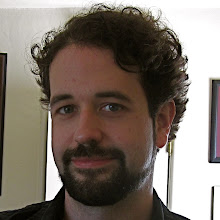ARISE is big on using Essential Questions that run across multiple subjects in a grade level, giving the students' entire learning experience a feeling of cohesion and unity. The questions for the 9th Graders this year are:
- Who Am I? (Anyone who fails to recognize the applicability of this has forgotten what it means to be fourteen.)
- Where Are We Going? (My perhaps-too-close-to-the-mark addition, "...and why are we in this handbasket?", is left unstated.)
- What Are The Tools That Will Get Us There?
In the case of biology these questions tie in nicely to the themes of physiology (looking at the student's own body), ecology (looking at how all of our lives, animal and plant alike, are tied together), and scientific skills and social outreach (which address the technical and personal aspects of how we're going to deal with the problems that face us as a species).
Given this progression, it was necessary to push ecology to the back burner and focus on physiology for the first unit of the course , with skills and social perspective spread throughout both units. This will engage the natural self-centeredness of 9th-graders, then (I hope) expand their thinking to the people and world around them. It might not be the most elegant presentation of biology, but it's the approach that will be the most immediately relevant to the students, and that's the important thing.
As far as lesson plans are concerned, I've worked out a syllabus for what to teach and when, which covers the entire semester. Victoria, my coach, agreed that it was a challenging curriculum but worth a try, provided that I keep giving the students opportunities to revisit what they've learned and integrate it with new concepts. I'll be using a lot of formative assessments this year, and the list provided in Chapter 10 will be a big help.
The key thing, from an instructional standpoint, will be to keep tying back everything that the students are learning to the big unifying concepts. Fortunately, I don't think it's that hard to do that in biology, because everything really is connected. My first unit -- "Your Body: A User's Manual" -- will use the analogy of the human body as a machine, which needs fuel (provided through the digestive system) and oxygen (the cardiovascular and respiratory systems) in order to run and a control system (the nerves, sense organs and brain) in order to steer it. I'll round out the unit with explorations of the three biology topics that can most easily capture students' attention: germs, drugs, and sex. (I'm particularly looking forward to my demonstration of germ transmission, which will use ... no, I'm saving that for a surprise.) Not coincidentally, these are three issues where our students are most in need of good instruction.
Yesterday I worked out what I'll need in order to do each of the lab experiments over the course of the year. Now I have to push to actually get those supplies, and as soon as possible. Good thing I don't actually have my first biology lesson until a week from tomorrow!

1 comment:
Way to be flexible, Chris-- this is one of the first big lessons in teaching--can you be flexible with where your students are, rather than where you think they "should be?" You're right-- what would be elegant to a biologist (who has a ton of background knowledge built up around the entire subject) is not perhaps what will draw students in. "What can I get by touching that person?" is probably a better bet. Have you seen the "Grossology" books? They are chock full of well-presented disgusting facts that my students loved--the books disappeared every year, which is definitely a sign that they were interesting.
Post a Comment